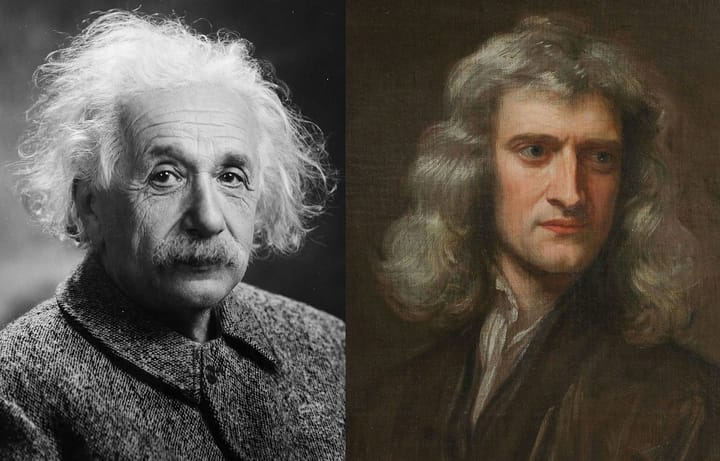Progress is a myth we tell ourselves to endure an indifferent universe. A dream of destiny masking our uncertainty about where humanity is truly going.
Amongst the strongest myths in society is the myth of progress. Progress, meaning a march towards somewhere, a better place, or a step in the right direction, is little more than an improperly formed lump of an idea. And in recent times, the flowery rhetoric of progress has been challenged but must once again be examined and made to bear its difficulties as well as its upshots.
I. Roots
The roots of the idea belong to the 19th century, but traces of it are certainly older, as Sir Francis Bacon (2014), in the 16th and 17th centuries, spoke about the need for a new methodology and science that would thereby further society. His notion of progress, albeit used in a different sense than that of today or the 19th century, warrants mention because of its youthful innocence. The age of machines was yet to come, and the agrarian serfdoms of Europe still dominated the lands, but something was afoot, and those keen enough, like Bacon, were able to see that a new age was approaching. The Renaissance indeed had ensured that nothing would be the same moving forward, and Bacon's ideas, among others', were characterized by an optimism of the sciences and what they would bring for society.
Fast forward to the 19th century, and the deaths of the Romantics decades earlier echoed in the noisy, polluted air. The factory had laid its claim to the soil, and while it coincided with the explosion of scientific innovation and attitudes that claimed to finally put the era of superstitions to rest, discontent had ensured a number of grievances arose from their graves. In other words, the era of Darwin and the machines, the era of brutish reductionist materialism and progress, brought about its toughest critics while conjuring criticisms from the past. The spirit of the times was of a cold fact and scientific demeanor, and it was no coincidence that Darwin's On the Origin of Species came out the same year as Marx's A Contribution to the Critique of Political Economy (with the latter being published in January, 1859, and the former in November). Progress' role, fueled by innovation and an emerging, fast-paced society, saw itself placed on a new throne by its subjects: from the scientist to the philosopher. And while Marx saw the culture and economic phenomena of capitalism as a stage to be overcome, he still embodied the notion of progress in moving past it to a new society, all while wearing the garb of a true scientist, not a bizarre ideologist or utopian—a necessity in a time where only the scientist, like Darwin, could be taken seriously.
While the critics of the age were in full swing, too few had properly taken the time to argue against the notion of what progress was at all. The question, seemingly answered by common attitudes, was held with wishes and beliefs in the sciences, industry, and the innovations to come from it. And while the remnants of the old Romantics and Utopianists often stood against what lay before them, their thought was swept under the tidal wave of scientific attitudes and dogma—they were another jaded superstition that stood in the way of the real advancement of humankind. The ghosts of the Romantics roamed the halls nonetheless, but for every Charles Dickens, who at times carried the tenor of a Wordsworth or Blake, there were 100 others who understood they lived in an imperfect world but still believed that the era of the machines and progress was beneficial. One can imagine this belief sitting easily with a nouveau riche factory owner, but it is less defensible in the labor man who had bought into the idea of 'the cost of progress.' And for every thinker, artist, or writer who viciously attacked certain aspects of the age, there were plenty more who embodied an albeit weary optimism for it. It was common for the laborer or child to lose an arm at the factory, but the age of progress and innovation would mean that weathering the storm now would set the foundations for the bright future to come. Whether that would see history take its natural course like in Marx or the various utopian dreams of a society returning to a communal setting. Struggle was a means of progress, and while the optimism of a better society through technology had waned, it had reluctantly transformed by changing its ends and not the means.
II. The World of Today & Progress Itself
I recount these ideas to present how deep the notion of an advancing society really is. And as they are now, these views are flatly untenable. Technology has indeed made leaps and bounds, but many would be willing to say that society and its structure haven't. Do not misunderstand: this idea is not a narrative of doom but simply a declaration that, while society is changing, the dreams of those in the past and for a better future have yet to be realized. We are still awaiting that promised time, the time that the idea of progress promises but never allows glimpses of. It is for that reason that the idea of progress must be criticized and skepticized. Too much has happened to believe the lie that humanity has a date with a sublime destiny, and to the objection that the optimism of progress has mostly faded, at face value it has, but in tenor it has not. Public intellectuals—like Steven Pinker (2018) in his Enlightenment Now—have made it a personal project to show the world that its gripes are actually mistaken, and really, the values born out of the Enlightenment have elevated the populace in nearly every relevant sense. But the weakness in showing statistics and graphs is that they do not refute lived experience, nor can statistics ever hope to embody them. The myth of progress still lives, frailly, but still so.
The time has now come to cut progress itself and the first objection of what it could possibly mean. To believe in progress for humanity is to believe there is an embedded meaning and destination for mankind. The notion of progress often goes hand-in-hand with a kind of social awareness, justice, and liberalism, but this is only the most popular view of it. Progress and what can be called the liberal attitude, though historically connected, are separable, albeit with a condition. The liberal attitudes and ideas of capitalism, for instance, can hardly be separated from the idea of progress in theory (that is how the notion was sold), but one can believe in progress and be against that attitude and capitalism. However, progress itself cannot be separated from its being a means to an end. And in popular culture, it is absurd to believe that such an end has been met, but to believe that steps have been taken in the right direction seems less absurd. Many would point to historical movements and trends, such as the abolishing of slavery in most modern states, as progress. Whatever can be called progress, and a social goodness in the case of the liberals, is still a ways from the destination progress promises. But throughout that dialogue of social justice and awareness, nowhere is it mentioned where progress leads to exactly. Although a beautiful idea, it leaves plenty of room for ambiguity. Is it a classless, stateless society? Is it a society of perpetual peace and harmony? Mankind dreams a long dream, and a possible 'better place' is as appealing to the philosopher as it is to the statesman and laborer, but what that entails lacks any central or agreed-upon meaning. The destination of progress is shrouded in mystery like myth, and to give the utopians, Marx, and the thinkers that would follow in his wake some credit, they at least had an idea of the kind of future they wanted, however flawed. In their thinking, 'progress' had made sense because there was a roadmap with a marked destination, despite how different said destination was through the eyes of the adherents of its various ideologies. But therein emerges an immense problem common to all its believers.
One cannot be a prophet, and this problem is deeper than the failure to have a united vision. Because even if everyone on Earth held such a vision and plan for the future, that would be no guarantee that such a destiny exists and would be realized. The very question of where society is going is misleading, for the simple fact is that it assumes there is a proper destination to begin with. The idea that there might be none precludes any characterization of said destination. In the worst-case scenario, the notion of progress requires knowledge of the future we couldn't possibly know. Whenever we invoke progress' name, a metaphysical destiny is conjured that is inseparable from the process. And in it, the destination is the alpha and omega, not the route to get there. After all, the difference between marching forward and aimless wandering rests on if there is a destination to begin with. But who is to say that such a destination is there at all? Forget the quibbles of which vision of the future triumphs over others; the very real danger is not only a future society failing to meet the expectations of ours, but also that there may be no future society to speak of. Threats of nuclear war, for example, loom over our heads and have done so for decades. Humanity at any moment is at risk of extinction, whether that be due to an anomalous event or our foolishness. It is indeed frightening, but who says we have a future?
III. The Comfortable Lie
I do not play the role of the prophet regarding the coming apocalypse like the leader of a doomsday cult, but the possibility remains, no matter how ugly. Given this, it should be clear that to claim "progress" in regard to society is well out of its depth. In the same way technology is said to be advancing—advancing to what and where? Society is of an entirely different game, and the possibility must be confronted that there is no teleology for the human race, no ultimate state besides the ones of our dreams. The position of humanity having a destiny, whatever that may be, is not without its dignity and significance. And it is a tragic circumstance that the position cannot be taken seriously if we want to be tough-minded and question our comfort. Being charitable to the idea nevertheless comes with issues of its own. In argumento, suppose that progress does lead to that better place, and we know for certain it exists. We would still be confronted with the problem of not the destination, but how to get there. A light is at the end of the tunnel, but in the darkness we may stumble and find ourselves on a completely different path. Not to mention, there would be no indication if we were on the correct one, assuming that there'd be only one. Relevant to that scenario but not merely that scenario, how can progress be proven? The silence around such a question borders on the absurd, and it is the inability to ask it that speaks volumes to the significant role it has played as a comfortable lie in society.
IV. A Murky Future
The term and flimsy idea of progress is then like a popular book that is seldom opened; the need to invoke its name has extended past the examination of its contents. And I suspect the contents are made by human hands, that progress is a superstition that not only survived the era that attempted to refute it but thrived in it. At bottom, the murky place for mankind's future is obfuscated and cannot be spoken about in detail without weaving myth, dream, or nightmare. That is not to say that it is valueless, but that is to say that it is an overestimation of what is knowable. We are then confronted with at least two strong possibilities, but not merely two. One is that there may be a teleology after all, but supposing there is one, there is nothing to suggest that we are on the right path to it. The second possibility, the more harrowing one, is that there is no teleology; there is no universal plan or destiny we march towards. If that is the case, then progress is a useful myth that humanity tells itself to withstand the blows of an indifferent universe. Inch by inch, we crawl towards paradise, and while the journey is treacherous, perhaps a bit of the optimism is in that, even if we never live to see it, our successors, far off in the distance, have the chance. That is the comfortable lie of progress, both dream and myth, and humankind cannot help but kill its own dreams.
References
Bacon, F. (2014). Novum organum; Or, true suggestions for the interpretation of nature. P. F. Collier & Son. https://www.gutenberg.org/cache/epub/45988/pg45988-images.html. (Originally published in the 17th century).
Pinker, S. (2018). Enlightenment now: The case for reason, science, humanism, and progress. New York, NY: Viking.
Written By Rex Eloquens




Comments ()